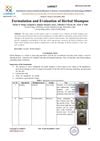 139 citations,
October 1999 in “Environmental Health Perspectives”
139 citations,
October 1999 in “Environmental Health Perspectives” Modern science supports the use of some Ayurvedic plants for health, as ancient practices suggested.
 25 citations,
March 2018 in “Clinics in Dermatology”
25 citations,
March 2018 in “Clinics in Dermatology” Indigenous herbal medicines in the Indian subcontinent have potential for drug development but need more research and standardization.
 December 2023 in “Research in pharmacy”
December 2023 in “Research in pharmacy” Phytotherapeutic compounds and supplements can help manage Polycystic Ovarian Syndrome (PCOS).
 57 citations,
October 2021 in “Journal of ethnopharmacology”
57 citations,
October 2021 in “Journal of ethnopharmacology” Indian herbal medicine shows promise for treating skin diseases but needs more research to prove effectiveness.
 1 citations,
December 2021 in “Annals of phytomedicine”
1 citations,
December 2021 in “Annals of phytomedicine” The herbal hair dye with a 1:2 henna to indigo ratio works well, is safe, and eco-friendly.
34 citations,
January 2022 in “Molecules/Molecules online/Molecules annual” Natural ingredients in cosmeceuticals are beneficial for skin and hair health with few side effects.
 30 citations,
June 2015 in “South African journal of botany”
30 citations,
June 2015 in “South African journal of botany” Traditional healers in Namibia use 70 different plants to treat AIDS-related diseases, and more research is needed to test these plants' effectiveness against HIV.
 105 citations,
January 2010 in “Mediators of Inflammation”
105 citations,
January 2010 in “Mediators of Inflammation” Skin surface lipids are important for skin health and altering them could help prevent aging and treat skin conditions.
 1 citations,
January 2017 in “Social Science Research Network”
1 citations,
January 2017 in “Social Science Research Network” The document suggests creating a secure database for indigenous knowledge and recommends that the TKDL actively fight patents that slightly alter traditional knowledge.
 5 citations,
February 2013 in “Expert Review of Dermatology”
5 citations,
February 2013 in “Expert Review of Dermatology” New acne treatments include combination creams, advanced retinoids, and light therapies, focusing on safety and patient adherence.
 3 citations,
January 2017 in “Revista chilena de nutrición”
3 citations,
January 2017 in “Revista chilena de nutrición” Certain natural compounds called terpenes may help prevent prostate cancer.
 3 citations,
September 2016 in “Natural Product Communications”
3 citations,
September 2016 in “Natural Product Communications” Germacrene analogs, especially 8-Hydroxy germacrene B, are more effective than germacrone at blocking a hormone-related enzyme and could help treat hair loss.
 January 2023 in “International Journal of Molecular Sciences”
January 2023 in “International Journal of Molecular Sciences” Maxillariinae orchids contain 62 compounds with potential health benefits, including treating skin conditions and diseases like cancer and diabetes.
 1 citations,
November 2023 in “Naunyn-Schmiedeberg's archives of pharmacology”
1 citations,
November 2023 in “Naunyn-Schmiedeberg's archives of pharmacology” Henna has potential health benefits and can treat various conditions, but more research is needed to confirm safety and effectiveness.

Ayurvedic herbs may reduce side effects and improve effectiveness of cancer treatments.
 January 2019 in “ARC journal of pharmaceutical sciences”
January 2019 in “ARC journal of pharmaceutical sciences” Acne can be managed with various treatments and requires psychological support due to its emotional impact.
 9 citations,
January 1966 in “Economic botany”
9 citations,
January 1966 in “Economic botany” Plant-based ingredients in hair care are being replaced by synthetic alternatives.
 December 2023 in “International Journal of Advanced Research in Science, Communication and Technology”
December 2023 in “International Journal of Advanced Research in Science, Communication and Technology” Herbal shampoo is safe, effective, and good for hair and scalp health.
 67 citations,
June 2018 in “Engineering in Life Sciences”
67 citations,
June 2018 in “Engineering in Life Sciences” Plant cell culture is a promising method for creating sustainable and high-quality cosmetic ingredients.
 4 citations,
September 2015 in “Bulletin of the Korean Chemical Society”
4 citations,
September 2015 in “Bulletin of the Korean Chemical Society” Researchers developed a quick and sensitive method to identify and measure hair growth-promoting substances in a herbal mix.
 116 citations,
December 2017 in “International Journal of Women's Dermatology”
116 citations,
December 2017 in “International Journal of Women's Dermatology” Adult female acne treatment should be personalized, considering individual preferences and pregnancy, using various topical and oral medications while managing side effects and resistance.
 18 citations,
June 2019 in “Clinical research in dermatology”
18 citations,
June 2019 in “Clinical research in dermatology” Acne can't be cured but can be managed with treatments like benzoyl peroxide and diet changes; it's costly and can lead to scarring and mental health issues.
 December 2024 in “International Ayurvedic Medical Journal”
December 2024 in “International Ayurvedic Medical Journal” Ayurvedic treatments may help reduce hypothyroidism symptoms.
 170 citations,
September 2019 in “Evidence-based Complementary and Alternative Medicine”
170 citations,
September 2019 in “Evidence-based Complementary and Alternative Medicine” Some medicinal plants can help heal wounds and may lead to new treatments.
 August 2017 in “Indian journal of history of science”
August 2017 in “Indian journal of history of science” The manuscript "Strīvilāsa" offers ancient Ayurvedic knowledge on women's health, beauty treatments, and reproductive care.
 112 citations,
May 2019 in “Pharmacological Research”
112 citations,
May 2019 in “Pharmacological Research” Lignans and neolignans from plants may help protect against various health issues, including cancer and heart disease.
14 citations,
November 2012 in “SLAS discovery” Some herbal extracts can promote hair growth and prevent hair loss.

























